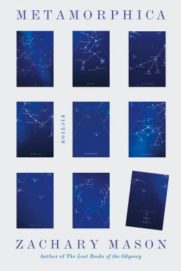 Zachary Mason
Zachary Mason
Farrar, Straus and Giroux ($26)
by Chris Via
Zachary Mason began his publishing career with a revitalization of Homer’s Odyssey, reserving his proclivities as a computer scientist for his second novel, Void Star, a work of science fiction with nods to William Gibson. Now he returns to revamping classics, this time following the historical trajectory from Greece to Rome with Ovid’s Metamorphoses. Recasting such monolithic literary forebears is a tricky business, but Mason executes his vision with a poise unexpected of someone concerned with distilling matter into data and algorithms. He appears to have no problem suspending the impulse toward scientific exactitude in favor of artistic liberty and poetic flourish.
Culling material from so vast a pantheon, Metamorphica emerges as an Ovidian florilegium of fifty-three brief chapters organized into “septants” that correspond to one of seven predominant gods. Mason explains that he selected the myths he liked and made them his own, just as Ovid did with Hesiod, Homer, Aeschylus, et al. The generous selection includes myths familiar to most readers: Pygmalion and Galatea, Theseus and the Minotaur, Daedalus and Icarus, Narcissus and Echo, Jason and Medea, Orpheus and Eurydice, Phaedra and Minos. Ovid himself is brought into the narrative, though not in the manner of Dante’s Virgil—Mason uses Ovid as a totem for the invocation and epistolary closing of the book.
The epic mode—much in the manner of Ovid’s strongest English translator, Allen Mandelbaum—complements Mason’s strengths as a writer. Homeric epithets like “the wind-troubled night” and the use of anastrophe, as in “a nightmare unending,” punctuate the narrative with a classical verve. Gritty warlike imagery heightens the smallest of moments: “the rain cut pale streaks on my blackened hands.” King Minos rivals the modern Italian poet Leopardi in his existential despair: “I drank too much, but not enough to make life bearable.” Achilles is rendered with shades of Ecclesiastes’ Kohelet; Menelaus, in his afterlife, prefigures Darwin, a figure who could rightly be called the nineteenth-century incarnation of Ovid; Daedalus recalls a Borgesian character at his most aleph-obsessed. Of all the episodes, “Europa” is the crowning achievement of characterization, symbolism, and aesthetic power—its candidacy for extraction and anthology ranks with Moby-Dick’s “The Whiteness of the Whale.”
Metamorphica, like its predecessor, is ultimately a book of changes, and the ancient narrative thus becomes its latest metamorphosis: a prose poem placed into the mouths of its own representative stars. Achilles laments the endless, meaningless procession of people and events, and Daedalus, no doubt speaking as a surrogate for the author, beckons us to consider his revelation that “in the end, there’s only pattern.” Mason’s craft, however, rushes ahead of all rejoinder and galvanizes the revelation with the addendum that pattern itself can be beautiful.
